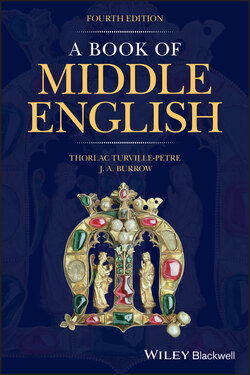Читать книгу A Book of Middle English - J. A. Burrow - Страница 45
4.4.4 Comparison of Adverbs
ОглавлениеAdverbs have the same comparative and superlative forms as adjectives; e.g. sone, ‘quickly’, soner, sonest; wisely, comparative wiselier, 15/38; swote, ‘sweetly’, superlative (dropping the final ‐t) swotes, 14a/3. Longe, ‘for a long time’, has comparative leng or lenger: in the same text there is no leng abide, ‘stay no longer’, 5/84, and no lenger abide, 5/330. Neh, ‘nearly’, has comparative ner, and superlative next, although its comparative form is increasingly used simply to mean ‘nearly’: dispayred wel nere, 8/169. Wel has comparative bet and superlative best: ho wel wiste, ‘she knew well’, 2/147, on jousteþ wel, anoþer bet, 13/116.
